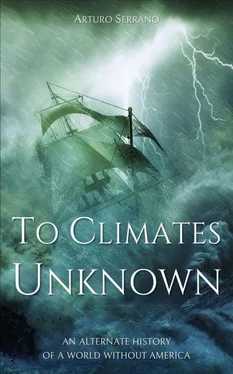And Kathrine Munk was nothing if not determined.
Leonora tapped against the metal of the pipe six times, meaning that the crew should make the vessel emerge. Five meant they should hold their position, and four meant there were enemies nearby. The ship had already used up its ammunition when they had taken it, but by staying deep enough it was able to evade attack, even from other submarines, because Danish military engineers hadn’t yet found a way to make gunpowder ignite underwater. After signaling her presence, Leonora took her boat a prudent distance away. The end of the breathing pipe had been closed and retracted. At that moment Kathrine would be ordering her rowers to operate the multiple pumps whose function was to remove water from a series of tanks in the ship and thus render it buoyant. After less than a minute, the shape of the D.H.M. Tarasque , officially lost in an accident during an assault on a Portuguese expedition tasked with charting the Indian Ocean, emerged in all its grandeur. Fruit of Christian’s obsession and Drebbel’s genius, a vessel of Hafgufuprojektet was a brute presence that refused to be dismissed, an incontestable fact that by its mere size and simplicity of shape displaced all other impressions from the observer’s mind as effortlessly as it did water. Leonora hoped it would never cease to have the same effect on her.
An airlock on top of the Tarasque opened and Kathrine climbed out. Leonora paddled closer to the massive structure of wood and bronze and tar, with a thick hemisphere of transparent glass on front, and helped her jump onto the boat.
“Did anything happen overnight?” asked the countess.
“Two more rowers have caught scurvy.” Kathrine raised her eyes to the open sky and felt a flood of relief as she took in the morning air. “I’m starting to feel weakened myself. We all need some shore leave.” Her knuckles tapped a signal on the hull of the Tarasque and it began the laborious procedure to submerge again.
“Not here,” said Leonora. “The last thing we need is for a crew of Danish deserters to be seen taking shelter in Sweden.”
Kathrine entertained the scenario and found that she liked it. “If you want to put it in those terms, losing our alliance with Sweden would hasten the end of the war.”
“By letting the wrong side win,” said Leonora. “I may be betraying my brother, but I won’t betray Denmark.”
“I thought we were doing this because we had become the wrong side.”
“Let’s not rehash that discussion.” Leonora cursed the brightness of the risen sun and started steering the boat back toward Stockholm. “I agree that your information—” She couldn’t finish the sentence. Her expression became fixed with terror.
Kathrine turned her head to the spot Leonora was looking at, and recognized the unmistakable pattern of waves generated by a submarine cannon being prepared to surface. “We were followed!” She tried to stand up to get a better look. The other ship had positioned itself out of sight of the Tarasque ’s lookout glass. “We need to warn the crew.” Her efforts to stay on her feet were rocking the boat.
Leonora grabbed her hand to force her to sit. “No, we need to flee, fast.”
Kathrine wiggled out of her grasp, and the boat responded to her forceful move by throwing them both into the water.
Leonora started to sink and hurried to rip off the gigantic skirt of her dress. Kathrine, who was wearing a soldier uniform, braced toward the quickly descending mass of the Tarasque , desperate to reach it in time to slam her palm against the hull, but the sound of a cannon shot crushed her efforts. The ball ripped a hole in the Tarasque , just above the waterline. The ringing in her ears drowned the cries of alarm she knew must be there. She was so stunned that she didn’t resist when her companion took her under her arm and dragged her away.
“Take air and dive,” urged Leonora.
Kathrine obeyed, too shocked to object. Once she was fully underwater, her survival impulse kicked in and her blood ran with alertness. She knew they had to take advantage of the shallower passages between islets, where the submarine wouldn’t be able to follow them. Above all, they must not let their pursuer know they were headed for the royal palace.
A full minute passed and she swam up to breathe, and quickly dove again because the gunner had been waiting for her reappearance to fire another shot. It passed well above their heads and got lost in the winding channels, which meant they were still very short of a safe distance.
They kept on swimming, taking as few breaths as possible, straining their limbs to move faster and their ears to be mindful of the provenance of the shots. They took so many turns and detours that they started fearing they’d lost their way among the maze of islands that protected Stockholm, and when they felt their legs brush against the sea bottom they realized they’d reached an area where the ship could not follow.
Kathrine walked up the shore and let herself collapse in tears. She felt guilty for not hearing the last gasps of her crew, and felt silly for feeling guilty. Leonora crawled beside her and glanced at the sun’s position before hugging Kathrine. “They took an oath. They died for the good of the nation. Now we have to honor their bravery. The king is waiting for us.”
“The king, the king, the king! I’m fed up with all of them. Kings have decided over the lives of common people for all of history. When will something of importance be permitted to happen without those leeches having their hands in it?”
Leonora said nothing; with the family she had, any word of comfort would have sounded insincere. She hadn’t known the crewmen of the Tarasque personally, but they had traveled with Kathrine through blockades and near-misses in the search for clues to Frederik’s misdeeds. It was easy to guess that the attack on them had been ordered by him. She gave Kathrine a moment to herself, until she was able to stand up and refocus on their mission.
Following Leonora’s lead, Kathrine started walking in the direction of the city. If things went their way from that point on, she’d have abundant time to mourn properly, in peace.
Morning, July 20 (Julian), 1651
Stockholm
The guards standing watch at the main gate of the Palace of the Three Crowns refused at first to believe that the two disheveled, muddied visitors asking to be let in could have any business to discuss with the king of Sweden. It was only when Kathrine pointed out that there was a warship nearby and that everyone in the city must have heard the distant echoes of multiple cannon shots that word was sent inside the palace, questions were asked of successively higher-ranked officers, and the order finally came to grant entrance to both women.
They were escorted into a gallery where one of the most luxurious art collections in Europe was slowly being built. King Kristina entered the room shortly after her guests, and even under the abundant illumination of the summer day, she took only the briefest notice of their disordered appearance. “It seems you had difficulties.”
“We were attacked,” said Leonora. “A Danish ship has just sunk ours.”
“Here, in the city?”
Both guests nodded, and Kristina moved toward one of her guards, but Kathrine said, “It’s no use searching for it. Your Majesty’s men will never find the kind of ship that Denmark has.”
“You have a very high opinion of Denmark’s—” Kristina’s eyes narrowed, and she turned to Leonora. “Is the Hafgufu here?”
“Yes.” She hadn’t come with the intention to reveal so much, but their situation had changed too fast for caution. “Let me introduce Kathrine Munk, governor of Nova Dania. She barely made it here alive. She’s risked everything to research what she has come to tell you.”
Читать дальше












